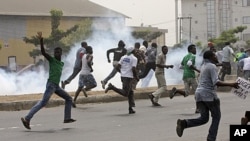The Nigerian government has reduced prices at the fuel pump, after a week-long nationwide strike and sometimes-violent protests.
Nigerian President Goodluck Jonathan has finally bowed under public pressure and announced that fuel will be reduced in price. In a televised address Monday, he said the cost will now will be around 60 cents a liter - a reduction of about 35 percent.
“The government will continue to push for full deregulation of the petroleum sector," said Jonathan. "However, we see the hardship being suffered by Nigerian and after consideration and consultations with governance and the leadership of the national assembly the government has approved the reduction of the pump price of petroleum to 97 naira per liter.”
Nigerian union leaders subsequently said they will suspend the nationwide strike over fuel prices that has crippled the country for the last week.
The fuel price still remains higher than the 45 cents per liter Nigerians paid before the government ended a popular consumer fuel subsidy on New Year's Day. The subsidy was one of the few benefits that the population enjoyed from Nigeria’s oil wealth.
Scrapping the subsidy caused the price of gasoline at the pump to double overnight, from $1.70 per gallon, or 45 cents per liter, to at least $3.50 per gallon - or 94 cents per liter.
Tens of thousands of people, many of whom live on less than $2 a day, took to the streets to express their consternation at the spiraling transport and food costs.
In his speech Monday, President Jonathan condemned the behavior of some protesters as "anarchical."
“It has become clear to government and all well-meaning Nigerians that other interests beyond the implementation of the de-regulation policy have hijacked the protest. This has prevented an objective assessment and consideration of the issues," said Jonathan. It promotes discord, anarchy and insecurity to the detriment of public peace. The government also salutes Nigerians who by and large conducted themselves peacefully while expressing their grievances. Let me assure you that government will continue to respect people’s rights to express themselves.”
As president Jonathan made the announcement on Nigerian television, a protest by labor and other civil societies due to take place on Monday was cancelled due to fears that government supporters were planning to hijack the event.
Many Nigerians are not happy with the newly-announced reduction. Onyinye Gandhi is a civil servant who helped organize the protests. “97 naira? We should be talking about 20 naira, 15 naira, or even ten naira, for sure,” said Ghandi.
President Jonathan believes Nigeria can no longer afford the $8 billion fuel subsidy.
He has promised to use the money on infrastructure and social programs.
“My dear compatriots, I urge you to have understanding for the imperatives of the adjustment of the pump price of petrol and to give government your full support to ensure its successful implementations. We call on Nigerians to go back to work and go about their normal duties," Jonathan said. "The government will not condone acts of criminality.”
The strike and protest took place as the government attempts to rein in rampant violence in the north, where the radical Islamist sect Boko Haram is blamed for a string of deadly shootings and bombings. The combination of events heightened fears that Nigeria may spin out of control. President Jonathan says that as president he has sworn to uphold unity, peace and order, and that he intends to fully carry out that responsibility.




